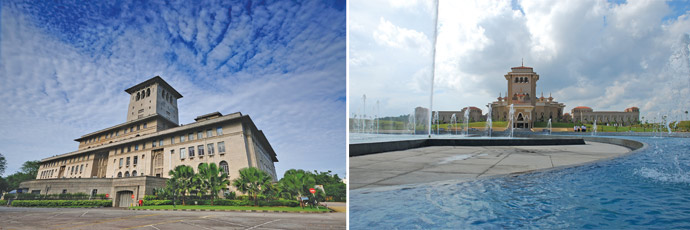The Johor Bahru region in southernmost Malaysia is emerging as a key regional oil and gas hub, and the Iskandar Regional Development Authority (IRDA), which is overseeing the 2,217-sq.-km. (856-sq.-mile) Iskandar Malaysia development project, will play an important role in fostering this sector. Iskandar Malaysia comprises five component areas, or flagship zones, that in their own right will bring forth new commercial, residential, educational and industrial developments designed to transform south Johor into an economic engine for Malaysia and Southeast Asia.
As of March 2012, RM87.5 billion (US$27.5 billion) had been invested in Iskandar Malaysia – 61 percent from domestic investors and 39 percent from foreign investors, with Singapore, Spain and Japan being the primary foreign investors. Investment in Iskandar’s nine key economic clusters is particularly welcome, those being financial advisory and consulting, creative industries, logistics, leisure and tourism,education, healthcare, electrical and electronics, food and agro-processing, and petrochemicals.
“Oil and gas has always been an activity that is associated with Iskandar Malaysia, even in pre-Iskandar days,” noted Ismail Ibrahim, Chief Executive of Iskandar Regional Development Authority, in a meeting with Site Selection Editor Mark Arend in March. “Although Johor as a state is not an oil producer, because of our geographical and strategic location, we are able to provide energy services capacity, for storage in particular and some downstream operations, not forgetting that Singapore [the island nation on Johor’s southern border] is also a big user of oil and gas. Hence, [Malaysian national oil company] PETRONAS, which is key in all this, has been setting up facilities not only in peninsular Malaysia but in Sarawak and Sabah by virtue of the oil fields and the related upstream and downstream activities.”
For many years, he adds, the oil and gas sector has been operating at facilities in Tanjung Pelepas, on the western side of Iskandar, and in Pasir Gudang, an industrial area east of Johor Bahru’s central business district. Both locations are within Iskandar Malaysia’s boundaries. A new petrochemicals complex from PETRONAS and co-investor BASF will dwarf these and will be located on a greenfield site east of Iskandar but well within its scope of influence in terms of labor supply, housing and additional investment the project is likely to trigger.
Project Launch Draws State, National Leaders
On May 13th, His Royal Highness the Sultan of Johor, Sultan Ibrahim Ibni Almarhum Sultan Iskandar, launched Malaysia’s largest refinery and petrochemical venture, the PETRONAS Refinery and Petrochemical Integrated Development (RAPID) project. Also in attendance at the launch, held near the proposed project site in Pengerang, Johor, were Prime Minister Dato’ Sri Mohd Najib Tun Abdul Razak, Johor Menteri Besar Dato’ Abdul Ghani Othman and PETRONAS’ President and Chief Executive Officer Dato’ Shamsul Azhar Abbas. PETRONAS defines the scope and mission of the RM60-billion (US$19-billion) project, which was first announced in 2011, as follows:
With a capacity to refine 300,000 barrels per day of imported crude oil, RAPID’s proposed refinery will act as the backbone of the project that will supply feedstock for the petrochemical complex. It will also produce a host of refined petroleum products, including gasoline and diesel that meet the Euro 4 and Euro 5 fuel specifications. The petrochemical component of the project will allow PETRONAS to expand its products portfolio from commodity petrochemicals to premium differentiated and specialty chemicals, capitalizing on the growing demand for these higher value products in the Asia Pacific region.
To support the development of RAPID, PETRONAS is also assessing the feasibility of developing a new liquefied natural gas (LNG) receiving and re-gasification terminal and a co-generation power plant. RAPID’s implementation is aligned with the Government’s strategies to establish new engines of growth for Malaysia and contributes towards raising incomes and improving the people’s quality of life. The project, which is greater in scale and scope than that of PETRONAS’ Melaka, Kertih and Gebeng complexes combined, has the potential to create multiple economic spin-offs for the oil and gas industry, develop downstream manufacturing industries, spur township development and infrastructures as well as provide new employment opportunities in the country, especially in Pengerang.
Coupled with the existing oil, gas and petrochemical facilities in the country, RAPID also supports the Government’s aspiration to turn Malaysia into a leading petroleum industry hub in the region. During its construction, the project is expected to require more than 40,000 contract-based workers. Upon completion, the project will offer about 4,000 new, permanent jobs for qualified Malaysians in the premium high-end technology value chain, creating a new generation of oil and petrochemical professionals. PETRONAS has already started making preparations to ensure the availability of qualified and trained personnel to work at the various plants and facilities within the RAPID complex. In addition, other long-term employment opportunities are expected to be created by service providers, suppliers, maintenance companies and related industries in the southern region to support the operation of the complex. RAPID’s project implementation is expected to commence by mid 2013, after PETRONAS reaches its final investment decision (FID).
